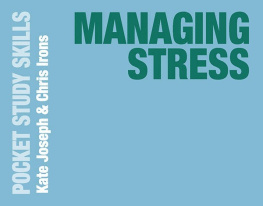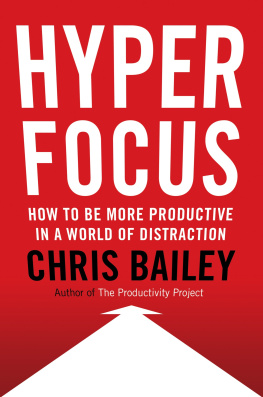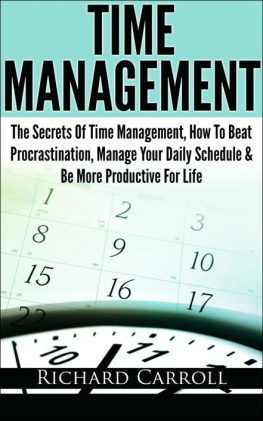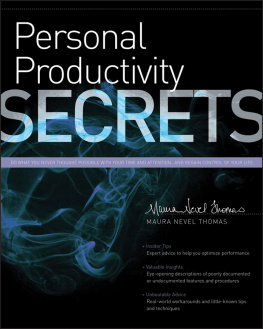Manage
yourself
Learn how to look after your most valuable asset you

Published by Pocket Manager Books
Regency House
2 Wood Street
Bath BA1 2JQ
www.kate-keenan.com
Copyright Kate Keenan 2015
Images copyright Oval Projects Ltd.
The right of Kate Keenan to be identified as author of this Work has been asserted by her in accordance with sections 77 and 78 of the Copyright, Designs and Patents Act 1988.
eISBN 978-1-909179-58-5
All rights reserved. No part of this publication may be reproduced, stored in a retrieval system, copied in any form or by any means or otherwise transmitted without written permission from the author.
Previously published as The Management Guide to Managing Yourself by Oval Books.
Images are reproduced by kind permission of Oval Projects Ltd.
Original series editor Anne Taut, Oval Books
Editor Catriona Tulloch Scott
Book and cover re-design Philip Jansseune, Walker Jansseune
Image enhancement Matt Holland, MiH Design
Author photograph Marko Dutka, Studio Marko
Cover: The difference between being confused and being organised is how well you manage yourself.
Contents
This book is dedicated to
those who would like to manage better
but are too busy to begin.
Manage yourself
Managing yourself is something that few people spend a great deal of time doing. It is often said that life is not a dress rehearsal, the implication being that as far as is known this is the only chance you get.
Whether you work for a large enterprise, manage a household or run your own business, to get the very best out of what you do it is vital to manage yourself well. You are your most valuable asset and it makes sense to take care of this, if you are to get the best return.
Most people want to do better in their endeavours. Those who achieve a measure of success are usually happy and productive. Managing yourself effectively is a key element in this process.
1 The juggling act
Coping with lifes demands is a constant juggling act, and, like the juggler, most people have to keep a number of balls in the air at the same time. There are three important areas where managing to do this is crucial. These are your work life, your home life and your personal life.
The difficulty is that there is very rarely a time when all of these three areas are in harmony. If you have two out of three under control at any one time, you are doing really well. If two or even three are presenting problems, you will probably find that you are spending most of your energy just coping. You will tend to have very little time for yourself and even less time to gauge how you are managing yourself. There are several aspects of your life that may signal to you that you are perhaps not managing yourself quite as well as you could.
Too much to do
People often take on too many responsibilities. Many of these are accepted willingly, but if you are a capable person, more responsibilities may have been thrust on you because of your perceived ability to get things done. This means you may have rather more to handle than you want. What is worse, should you fail to achieve what other people require of you, they can be very unforgiving. This will feel very unfair as you are almost certainly doing more than most. Possibly you are not very good at saying no. Or perhaps you allow others to lean too much on you for support.
Taking on too much prevents you from managing yourself effectively. You need to ask yourself if all your responsibilities are necessary. They may have been imposed upon you, or may be self-imposed because they covered tasks you think others expect of you. In either case, periodically you need to decide what you are willing to take on and what you should jettison.
In a rut
Working in a routine way can give you a false sense of security. You feel you are doing well because you are doing familiar things and you are so busy, too busy, perhaps, to make the active changes which could help you to manage yourself better and achieve more. Without realising it, you may have got into such a deep rut that you find it quite impossible to see how firmly embedded you are or to recognise that you need to extricate yourself.
Even if you do realise you are in a rut, the amount of effort you feel you would need to expend to change your routine can appear daunting, especially if you are not sure what benefits you may achieve from doing so. This is often why it seems so much easier just to carry on as you are, instead of summoning up the energy to do something to change your routine.
Lack of organisation
How well you are coping can be difficult to determine. Often a lack of personal organisation can be a symptom of the fact that you are coping badly. For instance, how often do you:
Frequently mislay things?
Rarely find enough time to think before acting?
Promise to do things then fail to do them?
Feel that no amount of extra effort makes any difference to the amount that still remains to be done?
If you recognise some of these situations, consider how you might organise yourself better. Often the common response to being under too much pressure is to feel that you have no time to get organised because you are so busy keeping up with what needs to be done. This is not a productive approach, for if you do not organise yourself, you will never be able to be efficient. The main benefit of making an effort to get yourself organised is that you will be able to cope considerably better in all areas of life.
The next step is to decide whether what you are doing is what you would like to be doing. Putting this into practice can be more difficult, particularly if you have not sorted out which of your activities are necessary, which are self-imposed, and which have been thrust upon you.
Becoming well organised means reflecting on how well you are managing yourself.
Stressed out
A frequent outcome of not managing oneself very well is the build up of a good deal of stress. You may not even realise that this is what is affecting you, nor understand how this contributes to things feeling out of control. Some stress is healthy. For instance, you need to be motivated to get out of bed and go to work. But high levels of anxiety are not, and when they prevent you from getting things done, remedial action is required.
Fortunately, there are some early warning signs that indicate this:
Constantly having to make excuses as to why things have not been done on time or to the agreed standard, when previously this has not been a problem.
Not having the time or energy for things you would really like to do because you are feeling too tired.
Finding yourself responding in an irritable and irascible manner about trivial things which have usually not bothered you.
Lacking enthusiasm for work which would normally have sparked your interest.
All these symptoms signal stress because they reflect behaviour that is out of the ordinary for you. You may be slow to realise that it is not you or your work, but stress that is the cause.
The wrong solutions
When trying to find ways of dealing with difficulties, some activities, which may seem to offer immediate solutions and alleviate the current situation, can ultimately present you with other problems rather than permanent answers. You may recognise some of these:
Blaming others or the circumstances. This is the usual method of averting guilt. You might even end up convincing yourself that it was not your fault.
Ignoring things in the hope that if you do so for long enough, they will go away. Sadly this never happens; they simply get worse.
Next page









